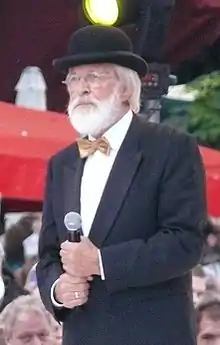Pierre Kartner
Petrus Antonius Laurentius "Pierre" Kartner (born 11 April 1935)[1] is a Dutch musician, singer-songwriter and record producer who performs under the stage name Vader Abraham (Father Abraham). He has written around 1600 songs.[1]
Pierre Kartner | |
|---|---|
 Kartner in 2007 | |
| Background information | |
| Birth name | Petrus Antonius Laurentius Kartner |
| Also known as | Father Abraham |
| Born | 11 April 1935 Elst, Netherlands |
| Genres | Levenslied, Schlager |
| Occupation(s) | Musician, songwriter, composer, record producer |
| Instruments | Vocals |
| Years active | 1962–present |
| Labels | Dureco |
| Associated acts | Wilma Landkroon, The Smurfs |
| Website | www |
Early years
Kartner started his singing career at the age of eight, by winning a local festival.[2] He lived with his family in Amsterdam and worked in a chocolate factory.[1]
Kartner worked as a promoter and producer at record label Dureco with Annie de Reuver, with whom he formed Duo X.[1] He was a member of the band Corry & de Rekels, which sold over one million records in the 1960s.
He created his well-known alter ego, Father Abraham, after writing a Dutch carnival song, "Father Abraham had seven sons". Initially he wore a fake beard, but subsequently grew a real beard which, along with a bowler hat, became his trademark.
In 1971 his duet with Wilma Landkroon, "Zou het erg zijn, lieve opa" (Would it be bad, dear grandfather?), reached Number one in the Dutch pop music charts.
The Little Café by the Harbour
In 1975, Kartner scored his second biggest hit, "Het kleine café aan de haven" (The little café by the harbour). This song has since been covered over 250 times in various languages.[2]
English cover versions include "The Little Cafe by the Harbour" by Engelbert Humperdinck, "My Favourite Cafe on the Harbour" by Audrey Landers and "The Red Rose Café" by Demis Roussos and also The Fureys. In French the song was recorded as "Le café de la Rue d'Amérique" by Mireille Mathieu and "Le café des trois Colombes" by Joe Dassin, and in German as "Die kleine Kneipe" by Peter Alexander.
The Smurfs
In May 1977, Kartner was asked to make a promotional song about The Smurfs. The record company initially only pressed 1,000 copies of the single, called "The Smurf Song", since they were unsure about the single's potential. However, they were all sold within one day at a Schlager festival.[3] After a repress, 400,000 singles were quickly sold. A full Smurfs album was then created, which sold 500,000 copies.[4] The album was released in several dozen countries, including France, Germany, Italy, Japan, Spain, and Sweden, and in various different languages. The album scored a number one hit in 16 countries. Subsequently, Kartner released other Smurf-themed albums, again in various countries and languages, such as Ga je mee naar Smurfenland (Dutch) and Vater Abraham im Land der Schlümpfe (German). In all, Kartner's Smurf works have sold around 17 million copies.[5]
Political songs
As a reaction to the 1973 oil crisis, Kartner and the right-wing politician Hendrik Koekoek recorded the duet "Den Uyl is in den olie" (den Uyl is in the oil), which blamed the Social Democratic prime minister Joop den Uyl and Arabs for the crisis. In the carnival season of 1975, he published "Wat doen we met die Arabieren hier" (What do we do with the Arabs here?), part of which translates as "What shall we do with the Arabs here?/They can't be trusted with our pretty women here.“ The record company has subsequently deleted the song.[6] His 1976 song, "Het leger der werklozen" (The army of unemployed) portrays the jobless as people who spend the day sitting in pubs, drinking alcohol.
In 2002 he recorded "Wimmetje gaat, Pimmetje komt" (Wim goes, Pim comes) with the populist politician Pim Fortuyn.[7]
Later career
In 1981 Kartner recorded a song about Weepuls, "Wij zijn de wuppies" (We are the Weepuls).[8] He wrote the music for the opening and closing credits on the Japanese cartoon adaption of the 1990 TV series Moomin and "Ik ben verliefd (Shalalie)", the Dutch entry for the 2010 Eurovision Song Contest.[9]
Kartner won the Buma Lifetime Achievement Award in 2015.[10]
Discography
- "Zo Is Het Leven" / "Rosalina"
References
- Strop, Jan-Hein (1 January 2001). "Pierre Kartner, de meest succesvolle artiest aller tijden". MT (in Dutch). Retrieved 15 December 2009.
- "Vader Abraham stopt over drie jaar". Trouw (in Dutch). 26 May 2007. Retrieved 15 December 2009.
- https://standbyproductions.nl/zangers/vader%20abraham.htm Biography from booking agency (in Dutch)
- "50 Jaar Nummer 1-Hits 1956-2006", Johan van Slooten, Becht Publishing, 2006
- https://www.ad.nl/show/vader-abraham-zei-eigenlijk-nee-tegen-smurfenlied~ae593920/ Dutch newspaper AD, 23th october 2018
- van der Steen, Paul (30 October 2013). "1972 Wat doen we met die Arabieren?" (in Dutch). Retrieved 4 February 2017.
- Bertens, Els (31 January 2002). "Vader Abraham maakt partijlied Leefbaar Nederland". 8 Weekly (in Dutch). Retrieved 15 December 2009.
- "Vader Abraham wil meedelen in wuppiesucces". Nieuws.nl (in Dutch). 16 June 2006. Archived from the original on 12 February 2010. Retrieved 15 December 2009.
- Bakker, Sietse (28 November 2009). "Pierre Kartner to write Dutch entry... in Dutch!". Eurovision Song Contest. Archived from the original on 13 June 2010. Retrieved 15 December 2009.
- "Buma-oeuvreprijs voor Vader Abraham" (in Dutch). NOS. 17 March 2015. Retrieved 17 March 2015.
External links
| Wikimedia Commons has media related to Pierre Kartner. |
- Official home page (in Dutch)
- Official home page (in German)
- Pierre Kartner at IMDb